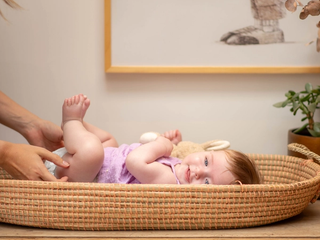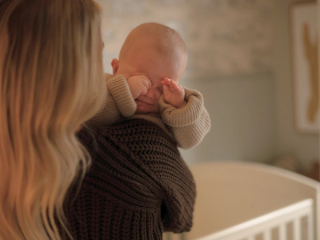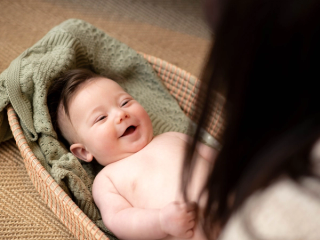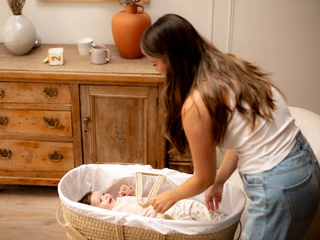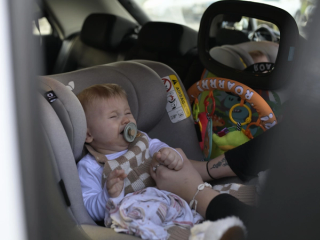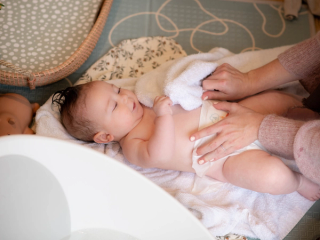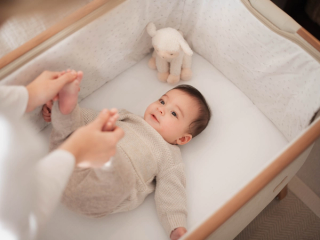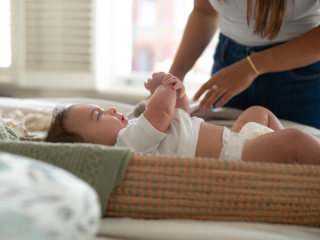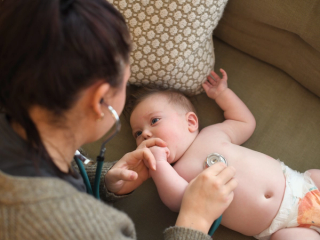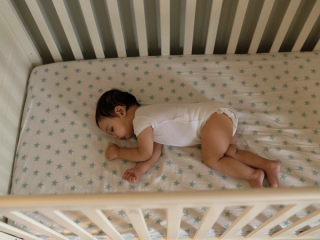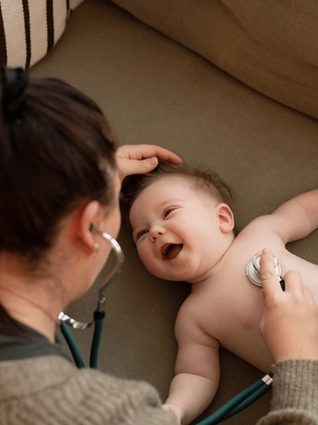
- Home
- Advice Hub
- Newborn
- Essential Newborn Care
- Newborn Baby Checks
Newborn Baby Checks
Discover essential health checks for you and your newborn, including initial exams, hearing tests, and follow-up appointments to ensure both of you are thriving.
After your baby is born, the midwife will begin a number of checks to ensure the wellbeing and health of your baby. All of the findings are recorded in the personal child health record, also known as the red book. The first observation takes places as soon as the baby is born and you may not even notice it’s being carried out. Keep reading to discover what checks the midwives and doctors carry out to ensure your baby is thriving.
Once your baby is born, and you've said hello, chances are the midwives will whisk him or her across the room for a few moments. You might wonder what they're doing over there – the answer is, they're performing what will be the first of many basic health checks, just to make sure everything's going the way it ought to.
Here's a rundown of all the ways that doctors and midwives make sure you and your baby are healthy and thriving.
Apgar test for newborns
An APGAR test for newborns is more of an observation and is carried out at approximately one minute after birth, and again at five minutes after the birth. When this is done, your baby is given what’s called an APGAR score.
This rates your baby in five areas: skin colour, heart rate, reflex response, muscle tone and breathing. Based on your baby's scores, the midwife will decide whether any extra help is needed to get your little one off to the best start. You probably won't even notice it's being done, midwives often calculate this in their head. If the score is low at 5 minutes, they may record again at 10 minutes.
A bit later, after you've had that first cuddle, your midwife will also record your baby's weight and head circumference, take their temperature and do a quick head-to toe check to make sure there is nothing immediate that needs attention. Anything that is picked up will be discussed with you and a paediatrician may be called to perform another check.
Newborn physical examination (NIPE)
A NIPE is a detailed infant examination that is carried out at some point within the first three days of birth, ideally before you are discharged home. A paediatrician or your midwife will have a closer, head-to-toe look at your baby to make sure everything's in good working order.
The test assesses the baby's heart, hips, eyes, and testes. During the heart examination, healthcare professionals listen for any abnormal sounds, such as heart murmurs, that may indicate congenital heart defects. The hips are checked for developmental dysplasia, ensuring the joints are properly formed. If they suspect any concerns with the hips, they may refer the baby for a developmental dysplasia of the hip scan (DDH). The eyes are examined for cataracts or other abnormalities, and for male infants, the testes are checked to ensure they have descended into the scrotum. They may also observe some of the natural reflexes such as the ‘stepping’ reflex, that healthy newborns have.
This is a great time to ask any questions you have – most new parents have quite a few! The doctor or midwife will also probably ask you about your family medical history, so be sure to mention any health issues that run in the family.
Heel prick test (New born Blood spot test)
Around five to eight days after the birth, your midwife will offer to take a tiny sample of blood from your baby's heel. This is known as the Newborn Blood Spot (NBBS). The midwife will prick the baby’s heel and place a few drops of blood on a special blood testing paper.
Holding and feeding the baby during the test is a great way to distract the baby and keep them calm. The sample is then sent off to a laboratory where it is tested for a number of rare disorders, including PKU (phenylketonuria), thalassaemia and cystic fibrosis. These are very rare conditions but are best identified earlier on in life. If any conditions are identified, you’ll be contacted quite early on.
Hearing screening test
The newborn hearing screening test is designed to identify hearing issues in babies early, ensuring any necessary support or treatment can begin promptly. This test is usually done within the first few weeks after birth, often before the baby leaves the hospital, but it can also be performed at home or in a local clinic.
The test uses two methods:
- The Automated Otoacoustic Emission (AOAE) test: a small earphone plays sounds, and the ear’s response is measured,
- The automated Auditory Brainstem Response (AABR) test: measures how the brain responds to sounds using small sensors placed on the baby's head..
None of the above test methods will cause any discomfort to your baby. If the results show a clear response, it indicates the baby has normal hearing at that time. If the test doesn’t show a clear response, it doesn’t necessarily mean the baby has hearing loss, but a follow-up test will be scheduled for further evaluation. Early detection through this screening allows for timely support if hearing loss is confirmed, helping the child’s communication and language development.
Tests for premature babies
Premature babies may undergo several additional tests that are not typically required for full-term healthy infants due to the higher risks associated with early birth. One key test is the screening for Retinopathy of Prematurity (ROP), a condition where abnormal blood vessels grow in the retina, which can lead to vision problems. This test involves regular eye examinations by a specialist starting a few weeks after birth. Premature babies also often receive cranial ultrasounds to detect any brain abnormalities, such as bleeding (intraventricular haemorrhage) or other brain injuries that could occur due to their early development.
Hearing tests may be conducted earlier or more frequently for preterm infants, and chest X-rays or echocardiograms might be performed to assess lung development and heart function, particularly if the baby has respiratory distress syndrome or other complications.
Blood tests to monitor for anaemia, infection, or electrolyte imbalances are also common. Premature infants may also require regular monitoring of their growth and development through more frequent assessments to ensure they are catching up to typical milestones.
Reviews for your baby in the first 3 months
6-8 week visit
Around 6-8 weeks after the birth of your baby, you’ll be advised to make an appointment with the GP to carry out an assessment of the baby. This is conducted to ensure the baby is developing normally and to identify any early signs of health issues. It typically takes place at a GP surgery or local health clinic as part of the postnatal care pathway.
During the check, the doctor or healthcare professional assesses the baby's overall growth, including weight, length, and head circumference. They examine the baby’s eyes, heart, hips, genitals, and abdomen to look for abnormalities such as congenital cataracts, heart murmurs, or hip dysplasia. The baby’s reflexes and muscle tone are also assessed to evaluate neurological development. These will have already been checked around birth so this is just a double check to ensure nothing has been missed.
Additionally, it allows parents to discuss any concerns they may have about feeding, sleeping, or general well-being. Your GP will also want to see you and your baby in order to make sure that you're recovering well from the birth. In your case, this may involve checking your urine, blood pressure, and examining any stitches you may have, along with discussing any concerns about postnatal mental wellbeing.
Health visitor
Once you're home and settled in with your new baby, you'll probably get a call from your health visitor. Health visitors are specially-qualified nurses or midwives to help with any issues you might be having as a family. They are there to help look after everyone's well-being, so do talk to them about how you're feeling as well. Their support is available from birth until your baby is five years old.
They usually visit at around 10-14 days after the birth which is the time in which you’ll likely be discharged by the community midwife. They will give you a lot of information regarding feeding, birth registration, baby developmental check, immunisations and baby clinics. In the first year of your baby's life, you'll probably visit your local baby clinic for regular baby weigh-ins and chats with your health visitor. It’s also a good place to meet other mums of young babies and to find out about local mother and baby groups.
Be sure to write down any questions you may have as it’s easy to forget things when you’re a new parent.
You’ll undoubtedly have a lot of questions in those early days and weeks after having a baby. Don’t hesitate to reach out to your midwife, health visitor or GP if you have any concerns relating to yours or your baby’s health during this time
